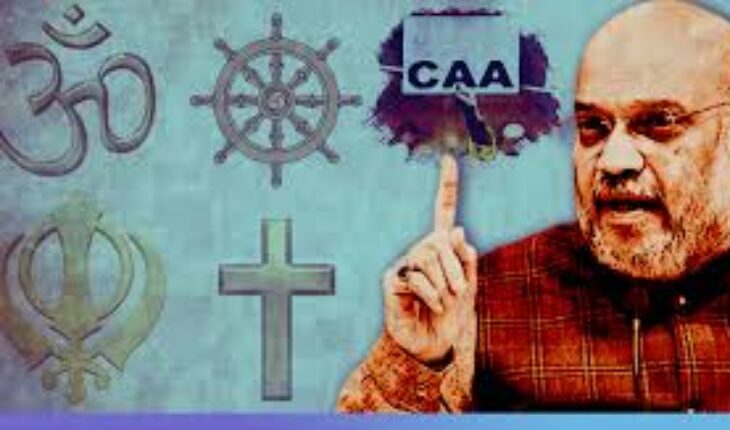New Delhi : Prime Minister Narendra Modi-led Union Government notified the rules of the Citizenship Amendment Act (CAA) 2019 less than a month just before the Lok Sabha elections 2024. Government also launched a helpline number. The CAA act may allow local priests to issue “eligibility certificates” to validate applicants’ religion, as per a response obtained through the Union Ministry of Home Affairs’ CAA helpline. The act allows the members of six minority communities from Pakistan, Afghanistan, and Bangladesh to get Indian citizenship faster. While notifying the rules, the government said the act aims to ensure proper resettlement of these persecuted minorities, who have faced years of oppression in the said countries.
The certificate, a mandatory document, is to be enclosed along with an affidavit and other documents that the applicants are to upload on the CAA portal. “The reasons for which applicant wishes to acquire Indian citizenship” must also be stated. When contacted through the helpline on March 27 to inquire about the format of the eligibility certificate, the person on the call responded, “It can be on a blank sheet of paper or on a judicial paper with a stamp value of ₹10.”
The Ministry initiated the helpline number 1032 on March 21 to provide assistance and information regarding the CAA, enabling applicants to make toll-free calls from any location in India between 8 a.m. and 8 p.m. When the rules were notified, the Ministry did not specify the authority or the body that could issue the certificate. Regarding who can issue the certificate, it was informed that “any local pujari (priest) can be asked to issue it.” A sources said, “Any institution which has the trust of people can issue the certificate. The final decision to grant citizenship will be taken by the empowered committee, the local institution is only recommending that they belong to a particular faith.”
Any individuals who migrated to India before December 31, 2014, from Pakistan, Afghanistan, and Bangladesh due to “religious persecution” and belong to six religious minorities- Hindu, Sikh, Buddhist, Jain, Parsi, and Christian are eligible to get citizenship under the “CAA 2019 Act”. The regulations outlined two supplementary documents in addition to those stated in Section 6B of the Citizenship Amendment Act (CAA) rules. Firstly, applicants are required to submit an affidavit affirming the accuracy of the information provided in their application, along with a separate affidavit from an Indian citizen endorsing the applicant’s character. On submission of the application, an acknowledgement in Form IX shall be generated electronically. The District Level Committee headed by the Designated Officer, as may be specified, shall verify the documents submitted by the applicant along with the application.
Secondly, the applicants must furnish a declaration confirming their proficiency in one of the languages specified in the Eighth Schedule to the Constitution of India. These additional requirements aim to ensure thorough verification and adherence to the eligibility criteria set forth in the CAA 2019 regulations.





